- Home
- Robert E. Howard
The Conan Compendium Page 18
The Conan Compendium Read online
Page 18
Gundermen and Bossonians hurried out to the open space between huts and palisade. They clapped helms on their heads, fastened mailshirts, and had pikes and bows ready. If by some accident this were no drill, they were ready for war.
"Foolishness," grumbled Benno. But his bow was strung and his quiver full.
"No doubt," said Granth. Then Captain Treviranus strode out in front of the
Aquilonians. Seeing his grim countenance, Granth began to wonder how foolish the horn call was.
"Something's gone wrong in Duthil," said Treviranus bluntly. "Count Stercus rode into the village a while ago, and he hasn't come out―at least, not this way. And the barbarians in there have been whooping and hollering ever since he did ride in. We'd better find out why they're in an uproar and calm them down ―if we can."
"What if we can't?" called someone. Granth could not see who it was, but the same question had crossed his mind. What would he and his friends have to do to pull Stercus' chestnuts out of the fire?
Treviranus faced the question squarely. "If they want trouble, we'll give them all they want and more. We can't let them think they can rise up against us. If they do, the whole countryside is liable to boil over." He waited to see if any more questions would come. When none did, he nodded. "All right, then. Let's go."
He led the Bossonians and Gundermen ― the whole garrison except for a handful of men left behind to hold the camp ―toward Duthil. That he led made the archers and pikemen follow willingly. Some officers would simply have sent the soldiers forth, but Treviranus was not one of that stripe.
Even before leaving the fortified encampment, Granth could hear the Cimmerians shouting and their women keening. A man came out of Duthil and strode straight at the oncoming Aquilonians. One man against a company of soldiers―but such was his fury that Granth almost halted and did tighten his grip on his pikestaff.
"Two!" shouted the Cimmerian in bad but understandable Aquilonian. "He kill two boys, steal girl. He pay! You all pay!"
"Count Stercus did this?" demanded Treviranus.
"Aye, he do! Dog and son of dog!" the Cimmerian said. "We catch, we kill."
Granth knew Captain Treviranus had no more love for Stercus than any other
Aquilonian did. Treviranus might have been able to soothe the villagers ― except that they did not want to be soothed. The man who had advanced on the soldiers stopped, picked up a stone, and flung it at them.
The stone thudded off a pikeman's buckler. The response of the Bossonian archers was altogether automatic. Bowstrings thrummed. Half a dozen shafts whistled through the air. They all pierced the Cimmerian. He took a couple of staggering steps toward the men from the south, as if still intending to assail them, then slowly crumpled.
"Damnation," said Treviranus quietly. "I wish that hadn't happened. Well, no help for it now. Forward, men. Battle line ―pikemen in front of the archers. We're likely going to have a fight on our hands now."
He proved a good prophet. No sooner had the Cimmerian fallen than more stones began flying at the Aquilonians from Duthil. At least two archers also began shooting from the village. A Bossonian cried out and sat down hard with an arrow through his thigh.
Vulth reached up and settled his conical helm more firmly on his head. "We're going to have to clean the place out now," he said, "and the barbarians in there are going to try to clean us out, too." Granth nodded. His cousin struck him as a good prophet, too.
Along with his comrades, Granth pressed on into Duthil. He saw no one on the street―but, down at the far end of it, two bodies sprawled in ugly death. The Cimmerian had not lied. Granth had not really thought he had.
A door flew open. A barbarian charged out swinging an axe. He chopped down one Bossonian and left another bowman pouring blood from a great gash in his leg. The pikemen turned on the barbarian then and stretched him lifeless in the mud, but not before he had taken more from the Aquilonians than they could ever take from him.
An arrow from the house next to the blacksmith's caught a pikeman three soldiers down from Granth in the throat. The other Gunderman clawed at the shaft that drank his life. He fell to his knees and then over on to his side. "Dever!" cried
Granth, but Dever would never hear him again.
"Now we have to crush them," Captain Treviranus said. "One house at a time, if we must, but crush them we will!"
Even after the battle in front of Fort Venarium, Granth had never imagined work like this. Men fought to the death with whatever weapons they had. Women snatched up kitchen knives and flung themselves at pikemen and archers. More often than not, they would plunge the blades into their own breasts rather than risk capture. The Aquilonians spared children ―until a boy who could not have been eight years old stabbed a Bossonian in the back. He had to reach up to get the knife between the bowman's ribs, but it found his heart. After that, the soldiers behaved as if they were destroying a nest of serpents.
Serpents, though, never stung back so savagely. Granth was one of the Gundermen who used a log to batter down the door to the smithy. The only person they found inside was a skeletally skinny woman whose gray eyes blazed in a face ghost-pale. She came at them not with a kitchen knife but with a long, heavy sword. She wounded two men, one of them badly, and fought with such ferocity that she made the Gundermen slay her.
"Mitra!" said Granth. "These aren't barbarians ― they're demons, demons straight from hell!"
"Mitra carry Count Stercus straight down to hell," panted Vulth. "If not for him, everything would be quiet here. Now-"
Now the Cimmerians of Duthil, making their final stand, thought of nothing but taking as many of their foes with them as they could. Wounded barbarians feigned death, lying quiet until they could spring up and strike one last telling blow. The shrieks of the sorely hurt and the dying on both sides rose up into the uncaring sky.
At last, all the Cimmerians in Duthil above the age of five or so lay unmoving.
Granth's pikestaff was scarlet along half its length. Gore splashed his mailshirt.
He no longer hesitated about spearing Cimmerians on the ground to make sure they would not rise again ―he had seen too many of them do just that. Vulth had
a bandage on his right arm. Benno had taken an arrow through his left hand.
Daverio was dead, his head smashed in by a Cimmerian despite his helm.
Captain Treviranus limped with a leg wound. "You're bleeding," he told Granth.
"Am I?" said Granth foolishly. He found he was, and that a chunk was missing from his left earlobe. He had no memory of getting hurt. Waving at the carnage all around, he asked, "What now, Captain?"
"Now I'd like to roast Stercus over a slow fire," answered Treviranus. "The whole countryside will rise up against us on account of this ―and for nothing!
Nothing!"
Vulth prowled the wreckage of the village. The carrion birds that had already begun to settle flew up again, croaking in annoyance, when he walked past. They came fluttering down again after he went by. When he came back to Granth and Treviranus, his face bore a worried expression. "What's wrong?" asked Granth.
"I've been looking for the blacksmith's body," said his cousin. "He's big as a bear―he shouldn't be hard to spot. But he's not here."
"Are you sure?" asked Treviranus. Vulth nodded. Granth could not remember seeing the smith in the brief, bloody, uneven battle. By Captain Treviranus'
frown, neither could he. The garrison commander said, "Where is he, then?" In Duthil, the Aquilonians found no answers.
Mordec and Balarg and Nectan the shepherd tramped north ― farther north than they were used to going. Nectan laughed and grinned at Mordec. "For one so grim, you've got a rare sneaky streak in you. Setting your son to guard the sheep is the best way I know to keep him from coming with us."
"I told him he could fight when war came again," answered Mordec. "Soon we'll know if it is here. That will be time enough to blood the boy in battle." He did not say that Conan was already blooded. The tim
e for battle might not yet be at hand.
If it were not, what point to spilling his son's secret and risking betrayal? Two had some small hope of keeping silent. Four, as far as he could see, had none ―
especially when he had brought Balarg with him not least to make sure the weaver spoke to no Bossonians or Gundermen. Maybe he did the man an injustice. If he did, he would apologize when the time came. Meanwhile ―Balarg pointed ahead, past the next line of evergreen-clad hills on the northern horizon. "Do you think they will be there?" he asked.
"Crom! They had better be there!" exclaimed Nectan.
"Even the invaders have begun to get wind of them," said Mordec. "If the accursed Aquilonians think they're there, there they're likely to be." He tossed his head, dismissing the question. "No point fretting about it, not now. Sooner or later, one way or the other, we'll know."
The most widely traveled of the men from Duthil, the blacksmith led the weaver and the shepherd along a winding trail over the side of one of those steep hills to the north. A broader, easier path went through a valley below, but Mordec steered his comrades away from it. They had already evaded two or three Aquilonian patrols. Being so obvious even ignorant foreigners could not miss it, the track in the valley was a logical place to find another.
Evade the Aquilonians they did. But the hill had not yet begun sloping down toward the north before a Cimmerian voice came out of nowhere: "Halt, dogs!
Halt or you die!"
"We are of your own folk," said Mordec. But he halted, a step in front of Balarg and Nectan.
A harsh laugh answered him. "I've already slain three Aquilonians trying to sneak up this way. The last one wore a black wig and spoke our language as well as I do. He died anyway― and he died hard."
"Come and see who we are," said Mordec calmly. "We seek Herth's men, if they be near." He stood ready to spring into the woods if the first arrow missed him ―and if it did, he aimed to avenge himself on the man who shot it, regardless of whether that man sprang from Aquilonia or Cimmeria.
After a moment, the Cimmerian came out into the track. He had a lean, pantherish build, and held a sword ready to use. His breeks were woven in the same checked pattern as Herth's had been. "I have friends behind me," he warned as he strode up to the men from Duthil. He prowled around them, then grudgingly nodded.
"You're of my folk, all right. But how do you come to have Herth's name in your mouth, when the clan he heads dwells far from these parts?"
Balarg swelled with indignation. "Did I not guest him in my own house? Did these my comrades not speak with him there?"
"I don't know. Did you? Did they?" The Cimmerian scout was unmoved. "If you did, say your names, and maybe I will know them." One by one, Mordec, Balarg, and Nectan told him who they were. At that, for the first time, the scout stopped sneering. "Aye, he spoke of you. Come with me, then, and I'll take you to him."
He ducked back into the woods, to return a moment later carrying a yew-wood longbow almost as tall as he was. Without looking back, he hurried north. The three men from Duthil matched him stride for stride.
After a while, Mordec asked. "Did you truly have friends back there?"
That made the man from Herth's clan stop and grin. "You'll never know, will you?"
Not too much later, the blacksmith realized he was heading downhill: he and his comrades had reached the north-facing slope at last. But the trees were so thick around him that he could not see very far. He tramped on. Sooner or later, he would learn what he needed to know.
About two thirds of the way down the hillside, the forest abruptly gave way to meadow. The Cimmerian scout pressed on. Mordec stopped dead in his tracks. So did Balarg and Nectan. Their eyes were wide with astonishment. After a moment, Mordec realized his were, too.
The encampment sprawled over more than a mile of land, tents and lean-tos thrown up in the wildest disorder and men picking their way between them. The disciplined Aquilonians would have laughed themselves sick at the chaos. But
they would have laughed out of the other side of their mouths at the great swarm of Cimmerians mustered here. Mordec had never dreamt so many of his countrymen could come together in one place without starting to murder one another. "Crom!" murmured Nectan, at least as astonished.
That soft exclamation made the scout realize he had lost the men he was supposed to be guiding. He looked back over his shoulder and saw them staring at the ragged but huge gathering of the clans. "Not bad, eh?"
"No." At the sight of such a host, Mordec's weariness fell from him like a discarded cloak. "Not bad at all."
Conan did not mind watching Nectan's sheep. As it often did, getting out of Duthil for a while appealed to him. If he did not have to see Tarla―and, most especially, if he did not have to see Count Stercus ―he did not have so great a need to brood about what might have passed between them.
Keeping an eye on the new year's lambs pleased him better. They were too large now for any eagle to hope to carry off, but they wandered farther from their mothers than they had when they were smaller. That made them easier for wolves to take ―or so it would have, at any rate, had the blacksmith's son not been vigilant.
On the little hillcrest from which he watched the flock, the air was crisp and clean and clear. It smelled of the meadow, and of the forests that were never far away in Cimmeria. The village stinks Conan was used to might have belonged to a different world. A slow smile stretched across his face. This was the life a man was meant to lead. If he could have spent the rest of his days herding sheep on the hillsides and meadows of his native land, he was sure he would have been happy.
He leaned back on the soft green grass, folded his hands behind his head, and smiled up at the sun, which had peeped out for a little while from behind the usually all-enshrouding Cimmerian mist. Some would have taken that pasture as an invitation to fall asleep, but Conan knew the sleeping shepherd was the one whose flock faced misfortune.
Regardless of what he knew, a yawn escaped his lips. He might have let himself
doze, there in the fitful sunshine. He might have ―but a sudden scream in the distance sent him scrambling to his feet.
The cry rang out again. It had to have burst from a woman's throat―and from the throat of a woman who knew herself to be in desperate peril. Conan snatched up his bow and quiver and began to run. He spared the sheep one brief glance over his shoulder as he dashed into the forest. For the next little while, they would have to fend for themselves.
Yet another scream dinned in Conan's ears. He nearly cried out himself, to tell the woman to keep screaming. Each shriek gave him a clearer notion of where she was. But if what harried her was man, not beast, Conan knew he would only warn that rescue was on the way. He held his tongue, but ran harder than ever.
At that pace, not even such a woodswise hunter as Conan could hope to travel silently. He heard small animals bounding away in all directions. He even saw a fox turn tail and flee. He remembered as much later. At the time, the fox scarcely registered.
Before long, he paused, panting, and cocked his head to one side. He knew he was close now, and did not want to run too far. A squawking commotion among the jays off to his left sent him hurrying in that direction. A moment later, another scream told him he had guessed well.
When he burst into the little clearing, he saw a girl on the ground, her tunic torn off, her bare skin white and glowing in the sun, her hands cruelly tied behind her, one of her ankles bound to a sapling. Above her towered a man who, by his swarthy coloring and light brown hair, had never been born in Cimmeria. The fellow looked up in surprise at Conan's arrival.
"Stercus!" cried Conan. "Die like the beast you are, you filthy Aquilonian devil!"
He nocked an arrow, raised the bow, and drew it with all the fury in him ― drew it with too much fury, in fact, for the bowstring snapped and the arrow spun away uselessly.
Count Stercus' sword already had blood on it. He gave Conan a mocking bow.
"You see how Mitra
favors me," he said. "I had not thought to combine two
pleasures here, but since you are kind enough to give me the chance ― " He slid forward in a fencer's crouch.
"Run, Conan! Save yourself!" called the girl.
"Tarla!" said Conan. Her words had on him the effect opposite the one she had intended. As long as she was in danger, he would not, could not, dream of fleeing.
Throwing aside the bow, which was no good to him now, he quickly stooped and grubbed two stones out of the dirt. He hurled one, the smaller, at Stercus' head.
The Aquilonian nobleman was swift and supple as a serpent. Laughing a mocking laugh, he ducked the flying stone. But even as he ducked, Conan flung the other stone at his right hand, and it stuck squarely. Stercus let out a sudden, startled howl of pain. His sword spun through the air, to land well out of reach. Roaring like a panther, Conan charged him.
Stercus matched the blacksmith's son in inches, but Conan was already wider through the shoulders than the invader. He thought to bear Stercus down and crush or choke the life from him. But what he thought was not what happened, for the nobleman was wise in ways of wrestling he had never imagined. Conan found himself lifted and flipped and slammed to the ground, the arrows flying out of his quiver to land all around him.
"However you like, Conan," said Stercus, smiling a twisted smile. "For any way you like, I am your master." He lashed out at Conan with a booted foot. But the blacksmith's son had expected that. He grabbed the boot with both hands and yanked. With a startled squawk, Stercus toppled. But he kicked Conan away when the Cimmerian would have sprung on top of him. The two of them grappled, rolling and pummeling and cursing each other as foully as they could.
Stercus soon found the fight warmer than he really wanted. He tried to knee Conan in the groin. More by luck than by Conan's design, Stercus caught him in the hipbone instead: a painful blow but not a disabling one. Conan seized a fallen arrow and scored the back of Stercus' hand with the point. Stercus' laugh was more than half snarl. "You'll have to do better than that, barbarian!" he said.

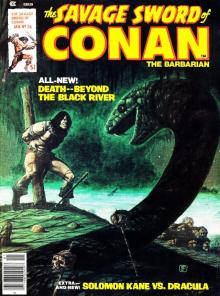 Beyond the Black River
Beyond the Black River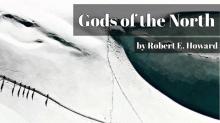 Gods of the North
Gods of the North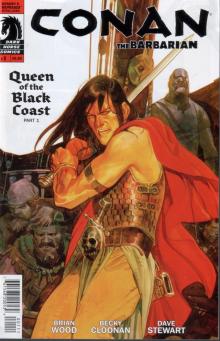 Queen of the Black Coast
Queen of the Black Coast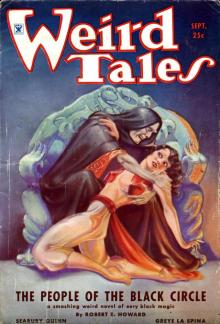 The People of the Black Circle
The People of the Black Circle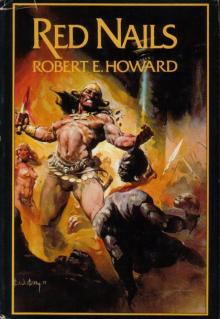 Red Nails
Red Nails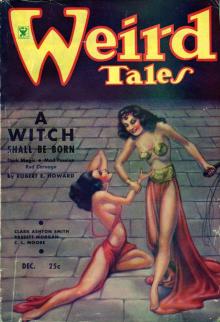 A Witch Shall Be Born
A Witch Shall Be Born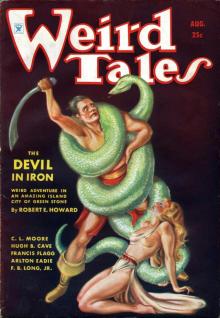 The Devil in Iron
The Devil in Iron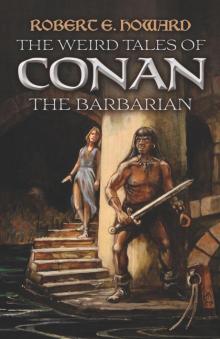 The Weird Tales of Conan the Barbarian
The Weird Tales of Conan the Barbarian The Bloody Crown of Conan
The Bloody Crown of Conan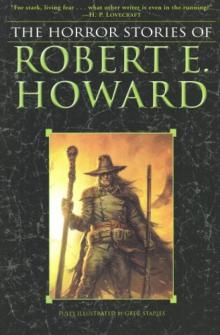 The Horror Stories of Robert E. Howard
The Horror Stories of Robert E. Howard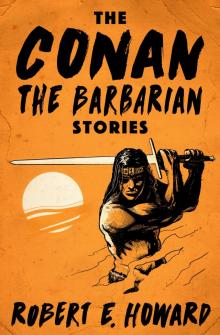 Conan the Conqueror
Conan the Conqueror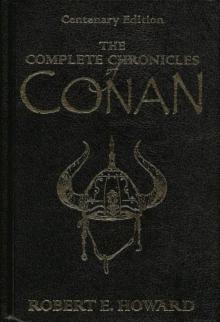 Conan the Barbarian
Conan the Barbarian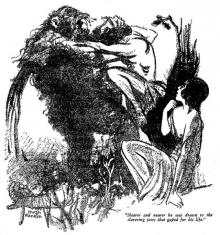 Shadows in the Moonlight
Shadows in the Moonlight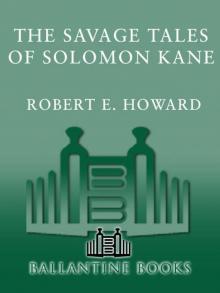 The Savage Tales of Solomon Kane
The Savage Tales of Solomon Kane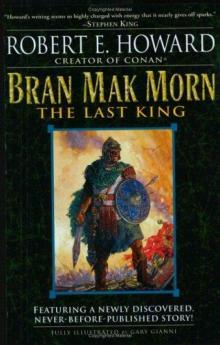 Bran Mak Morn: The Last King
Bran Mak Morn: The Last King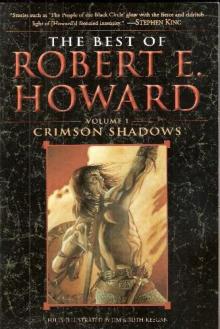 The Best of Robert E. Howard Volume One: Crimson Shadows
The Best of Robert E. Howard Volume One: Crimson Shadows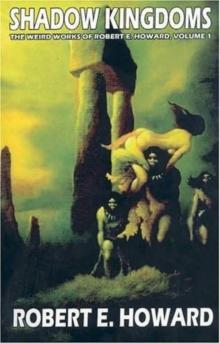 The Best of Robert E. Howard: Crimson Shadows (Volume 1)
The Best of Robert E. Howard: Crimson Shadows (Volume 1)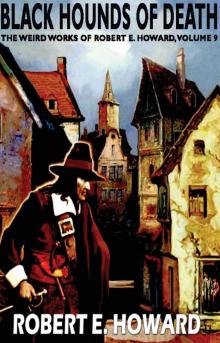 Black Hounds of Death
Black Hounds of Death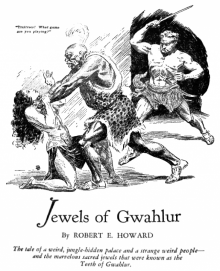 Jewels of Gwahlur
Jewels of Gwahlur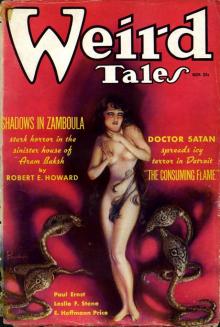 Shadows in Zamboula
Shadows in Zamboula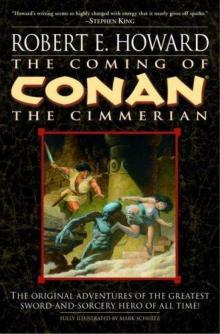 The Coming of Conan the Cimmerian
The Coming of Conan the Cimmerian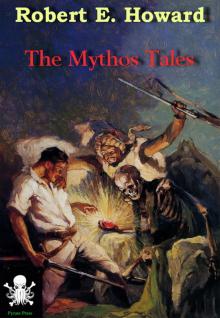 The Mythos Tales
The Mythos Tales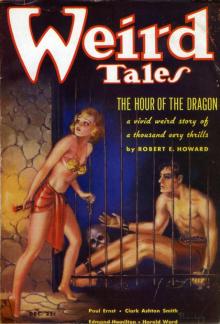 The Hour of the Dragon
The Hour of the Dragon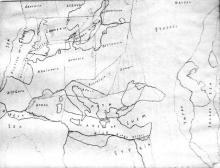 The Hyborian Age
The Hyborian Age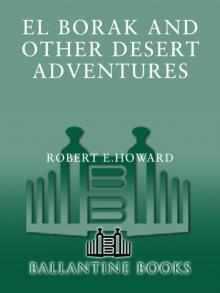 El Borak and Other Desert Adventures
El Borak and Other Desert Adventures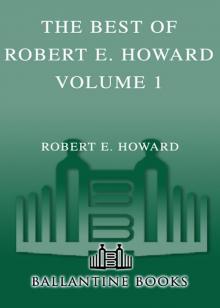 The Best of Robert E. Howard Volume 1 The Best of Robert E. Howard Volume 1
The Best of Robert E. Howard Volume 1 The Best of Robert E. Howard Volume 1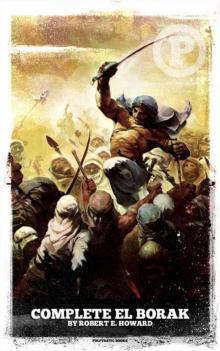 El Borak: The Complete Tales
El Borak: The Complete Tales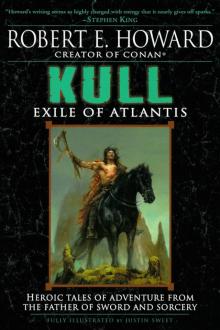 Kull: Exile of Atlantis
Kull: Exile of Atlantis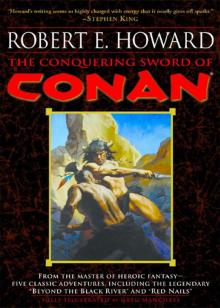 The Conquering Sword of Conan
The Conquering Sword of Conan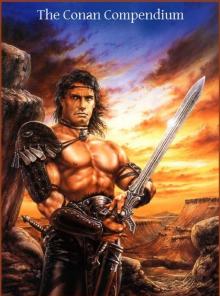 The Conan Compendium
The Conan Compendium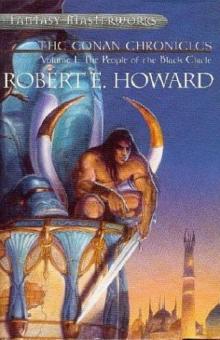 The Conan Chronicles: Volume 1: The People of the Black Circle
The Conan Chronicles: Volume 1: The People of the Black Circle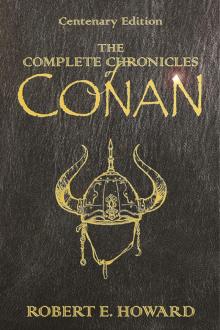 The Complete Chronicles of Conan: Centenary Edition
The Complete Chronicles of Conan: Centenary Edition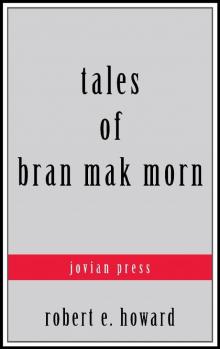 Tales of Bran Mak Morn (Serapis Classics)
Tales of Bran Mak Morn (Serapis Classics)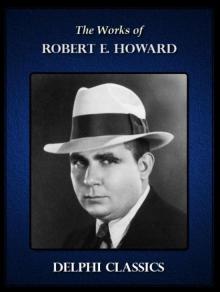 Delphi Works of Robert E. Howard (Illustrated) (Series Four)
Delphi Works of Robert E. Howard (Illustrated) (Series Four)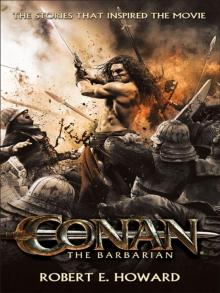 Conan the Barbarian: The Stories That Inspired the Movie
Conan the Barbarian: The Stories That Inspired the Movie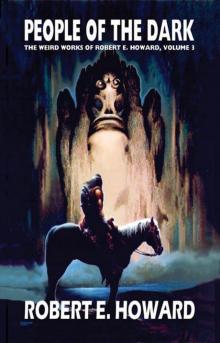 People of the Dark Robert Ervin Howard
People of the Dark Robert Ervin Howard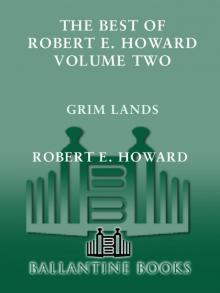 Grim Lands
Grim Lands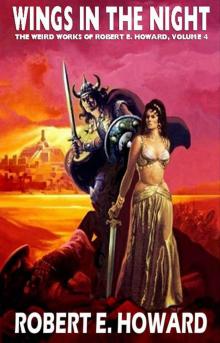 Wings in the Night
Wings in the Night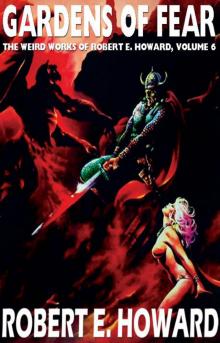 Gardens of Fear
Gardens of Fear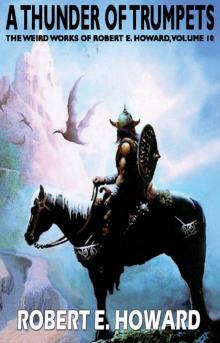 A Thunder of Trumpets
A Thunder of Trumpets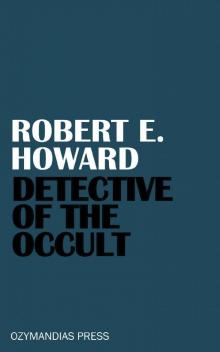 Detective of the Occult
Detective of the Occult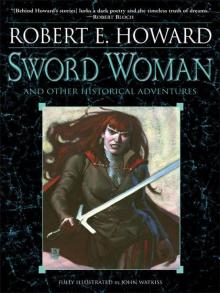 Sword Woman and Other Historical Adventures
Sword Woman and Other Historical Adventures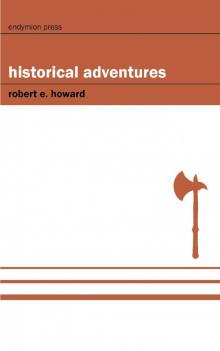 Historical Adventures
Historical Adventures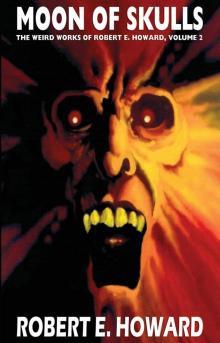 Moon of Skulls
Moon of Skulls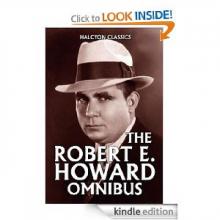 The Robert E. Howard Omnibus: 97 Collected Stories
The Robert E. Howard Omnibus: 97 Collected Stories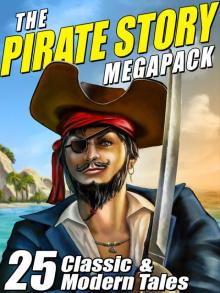 The Pirate Story Megapack: 25 Classic and Modern Tales
The Pirate Story Megapack: 25 Classic and Modern Tales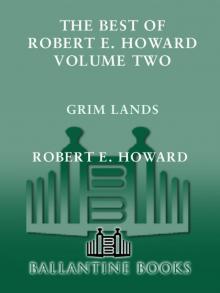 The Best of Robert E. Howard, Volume 2
The Best of Robert E. Howard, Volume 2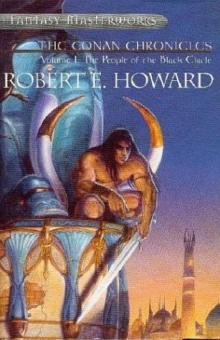 The Conan Chronicles, Vol. 1: The People of the Black Circle
The Conan Chronicles, Vol. 1: The People of the Black Circle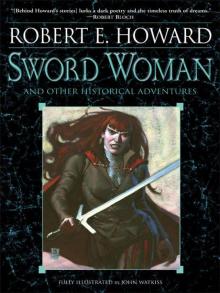 Sword Woman and Other Historical Adventures M
Sword Woman and Other Historical Adventures M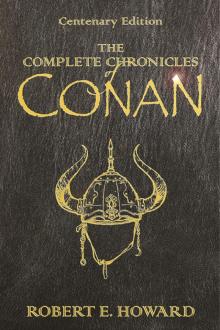 The Complete Chronicles of Conan
The Complete Chronicles of Conan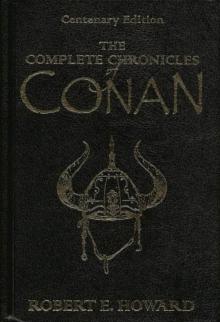 Conan the Barbarian: The Chronicles of Conan (collected short stories)
Conan the Barbarian: The Chronicles of Conan (collected short stories)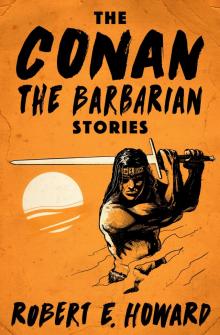 The Conan the Barbarian Stories
The Conan the Barbarian Stories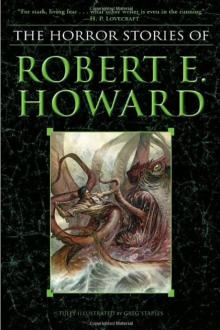 The Best Horror Stories of
The Best Horror Stories of Tigers Of The Sea cma-4
Tigers Of The Sea cma-4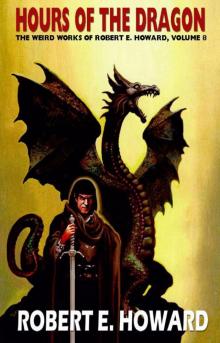 The Hours of the Dragon
The Hours of the Dragon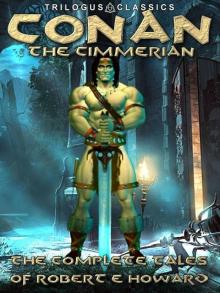 Conan the Cimmerian: The Complete Tales (Trilogus Classics)
Conan the Cimmerian: The Complete Tales (Trilogus Classics)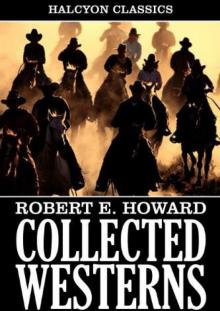 Collected Western Stories of Robert E. Howard (Unexpurgated Edition) (Halcyon Classics)
Collected Western Stories of Robert E. Howard (Unexpurgated Edition) (Halcyon Classics)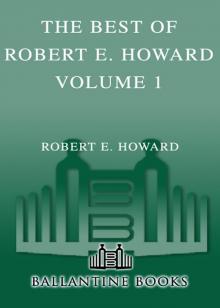 The Best of Robert E. Howard, Volume 1
The Best of Robert E. Howard, Volume 1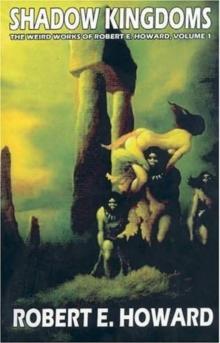 Shadow Kingdoms
Shadow Kingdoms